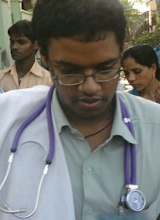London: A new superbug from India could spread around the world – in part because of medical tourism – and scientists say there are almost no drugs to treat it.
Researchers said on Wednesday they had found a new gene called New Delhi metallo-beta-lactamase, or NDM-1, in patients in South Asia and in Britain.
US health officials said on Wednesday there had been three cases so far in the United States – all from patients who received recent medical care in India, a country where people often travel in search of affordable healthcare.
NDM-1 makes bacteria highly resistant to almost all antibiotics, including the most powerful class called carbapenems. Experts say there are no new drugs on the horizon to tackle it.
"It's a specific mechanism. A gene that confers a type of resistance (to antibiotics)," Dr. Alexander Kallen of the US Centers for Disease Control and Prevention in Atlanta said in a telephone interview.
With more people traveling to find less costly medical treatments, particularly for procedures such as cosmetic surgery, Timothy Walsh, who led the study, said he feared the new superbug could soon spread across the globe.
"At a global level, this is a real concern," Walsh, from Britain's Cardiff University, said in telephone interview.
 Almost as soon as the first antibiotic penicillin was introduced in the 1940s, bacteria began to develop resistance to its effects, prompting researchers to develop many new generations of antibiotics. But their overuse and misuse have helped fuel the rise of drug-resistant "superbug" infections like methicillin-resistant Staphyloccus aureus, or MRSA."Because of medical tourism and international travel in general, resistance to these types of bacteria has the potential to spread around the world very, very quickly. And there is nothing in the (drug development) pipeline to tackle it."
Almost as soon as the first antibiotic penicillin was introduced in the 1940s, bacteria began to develop resistance to its effects, prompting researchers to develop many new generations of antibiotics. But their overuse and misuse have helped fuel the rise of drug-resistant "superbug" infections like methicillin-resistant Staphyloccus aureus, or MRSA."Because of medical tourism and international travel in general, resistance to these types of bacteria has the potential to spread around the world very, very quickly. And there is nothing in the (drug development) pipeline to tackle it."Medical Tourism.

"India also provides cosmetic surgery for other Europeans and Americans, and it is likely NDM-1 will spread worldwide," the scientists wrote in the study.
Walsh and his international team collected bacteria samples from hospital patients in two places in India, Chennai and Haryana, and from patients referred to Britain's national reference laboratory from 2007 to 2009.
They found 44 NDM-1-positive bacteria in Chennai, 26 in Haryana, 37 in Britain, and 73 in other sites in Bangladesh, India and Pakistan. Several of the British NDM-1 positive patients had traveled recently to India or Pakistan for hospital treatment, including cosmetic surgery, they said.
NDM-1-producing bacteria are resistant to many antibiotics including carbapenems, the scientists said, a class of the drugs reserved for emergency use and to treat infections caused by other multi-resistant bugs like MRSA and C-Difficile.
Kallen of the CDC said the United States considered the infection a "very high priority," but said carbapenem resistance was not new in the United States. "The thing that is new is this particular mechanism," he said.
Experts cited two drugs that can stand up to carbapenem-resistant infections – colistin, an older antibiotic that has some toxic side effects, and Pfizer's Tygacil.
For many years, antibiotic research has been a "Cinderella" sector of the pharmaceuticals industry, reflecting a mismatch between the scientific difficulty of finding treatments and the modest sales such products are likely to generate, since new drugs are typically saved only for the sickest patients.
But the increasing threat from superbugs is encouraging a rethink at the few large drugmakers still hunting for new antibiotics, including Pfizer, Merck, AstraZeneca, GlaxoSmithKline and Novartis.
Anders Ekblom, global head of medicines development at AstraZeneca, whose Merrem antibiotic was the leading carbapenem, said he saw "great value" in investing in new antibiotics.
"We've long recognized the growing need for new antibiotics, he said. "Bacteria are continually developing resistance to our arsenal of antibiotics and NDM-1 is just the latest example."
source- ibnlive








Join The Community